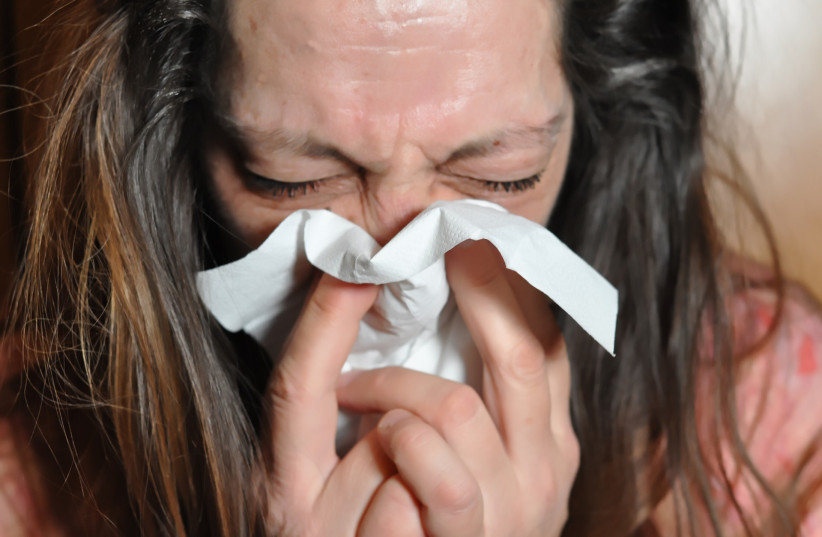It bothers kids, disrupts their sleep, soils the face and clothes and it seems as if it will never end. Rhinitis, a runny nose, caused by allergies usually affects kids in winter for a variety of reasons, and if you’re seeking ways to treat it and provide relief for your baby or toddler you’ve come to the right place.
Let's start with vital information courtesy of naturopath Sigalit Berman. The runny nose is the result of internal fever (not measurable fever) that can be caused by a number of reasons: illness, chills, teething, stress, improper diet, allergies to food or other substances, and more. The mucus color may help [inpoint the source of the problem.
Clear mucus, lasting for several days or more, will probably be associated with a cold and will sometimes appear at the beginning of the disease in order to drain out toxins. Chronic clear rhinitis indicates an allergy.
Yellow mucus indicates an active disease. Sometimes a clear runny nose will turn yellow after a short time.
White or green usually indicates a cold.

Natural solutions for the treatment of rhinitis:
Apart from the solutions you’re probably familiar with - chopped raw onions, which are placed next to the child's bed at night, or occasionally spraying salt water, you can use essential oils to treat rhinitis, in consultation with a qualified medical professional. You should combine the types of essential oils, and not use a single essential oil as it may be less effective.
Essential oils for use from birth to one year of age:
- chamaemelum nobile
- lavendula officinalis
How to use and dosages:
For the bath: 1-2 drops in the bath. Kids should stay in the bath for five to seven minutes.
Massage: Put one drop of essential oil in each 6cc of oil or cream. Mix well and massage into skin.
Essential oils for use from one year to age three:
- eucalyptus radiate
- cinnamomum camphora ravintsara (camphor)
- myrtus communis
How to use and dosages:
For the bath: Put two drops in bath water; kids should soak for five-seven minutes.
Massage: put one drop in each 5cc of cream, massage into skin.
Essential oils can also be heated so kids can inhale the essence.
Put four-twelve drops of pure oils (depending on room size) into water and boil, or put into a compartment of an electric diffuser. Plug it in; the essence will fill the air and kids can breathe it in.
Drizzle one drop on the shirt in the chest area during the day. For babies and young children, drip on your finger first and place on the shirt.
Drip on the corners of the bed during sleep. Put a drop of the mixture on each side of the bed, in the head area, but away from the face. It’s recommended to drip in the area where the mattress curves outwards, and for really young babies put one drop on a cloth diaper and tie at the far end where the baby can’t reach it and pull.
Nutrition during rhinitis
A doctor should be consulted to see if it’s advisable to replace dairy formula with soy or another substitute. The type of formula, as dairy may cause a baby’s runny nose. For toddlers, increase the consumption of the following foods:
● Foods rich in antioxidants - berries, cinnamon, a variety of vegetables and fruits.
● Onions and garlic help the immune system fight off viruses.
Vegetables and fruits rich in vitamin C, with antioxidant and antiviral properties such as kiwi, guava, red pepper, leafy veggies and citrus fruits as long as there isn’t phlegm.
Foods that prevent the accumulation of mucus such as root vegetables (parsley, radish, sweet potato, celery, kohlrabi and more), whole grains, barley and legumes.
Soups - especially those that include orange vegetables that contain beta carotene and help balance the respiratory mucosa: sweet potatoes, pumpkin carrots, etc.
Zinc-rich foods such as legumes, sprouts, seeds and nuts, fish and seafood, and whole grains. Zinc inhibits a protein that acts in the immune system in an infectious state, thus helping to create control over the onset of an inflammatory process.
Nuts, almonds, seeds (mainly flaxseed) and northern sea fish (salmon, mackerel) - contain essential fatty acids that strengthen the activity of the immune system, reduce the production of inflammatory prostaglandin hormones and increase the production of prostaglandin-reducing hormones. Nuts, almonds and seeds should be consumed in their natural form, without roasting, because roasting causes oxidation and destruction of essential substances.
What should you avoid?
Foods such as meat, fish, eggs, dairy products, white bread/pasta and soft drinks
Foods with allergenic potential, due to their ability to increase mucus production, such as milk and cheese, white flour products, citrus fruits, bananas, peanuts and more.
Foods that weaken the immune system such as junk with sugar, food coloring, flavors and aromas including industrialized, processed and preserved foods
The above list is for informational purposes only and use is the responsibility of the reader. Before use, consult a qualified medical professional.
This article was written in partnership with the JAMA parenting app.
